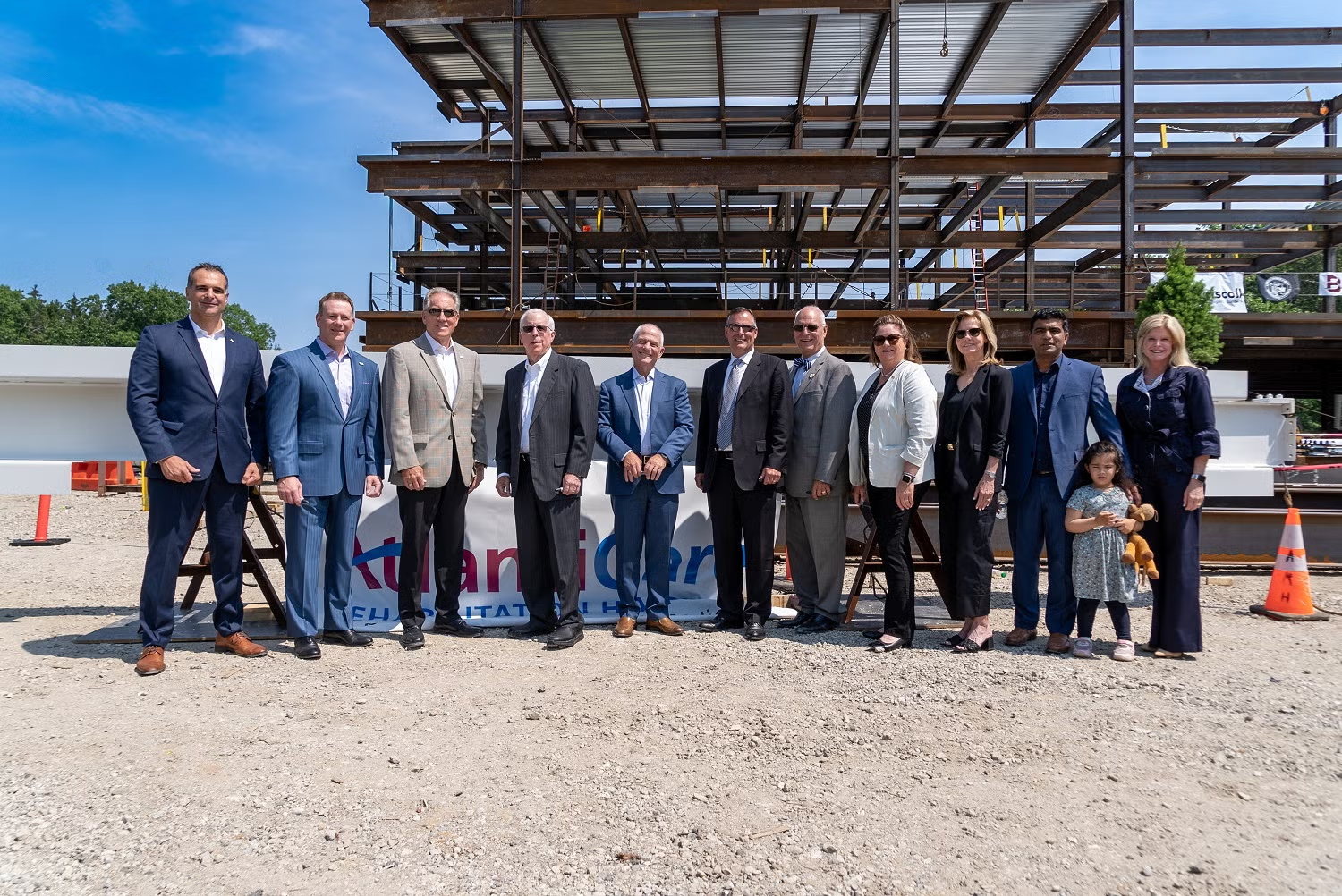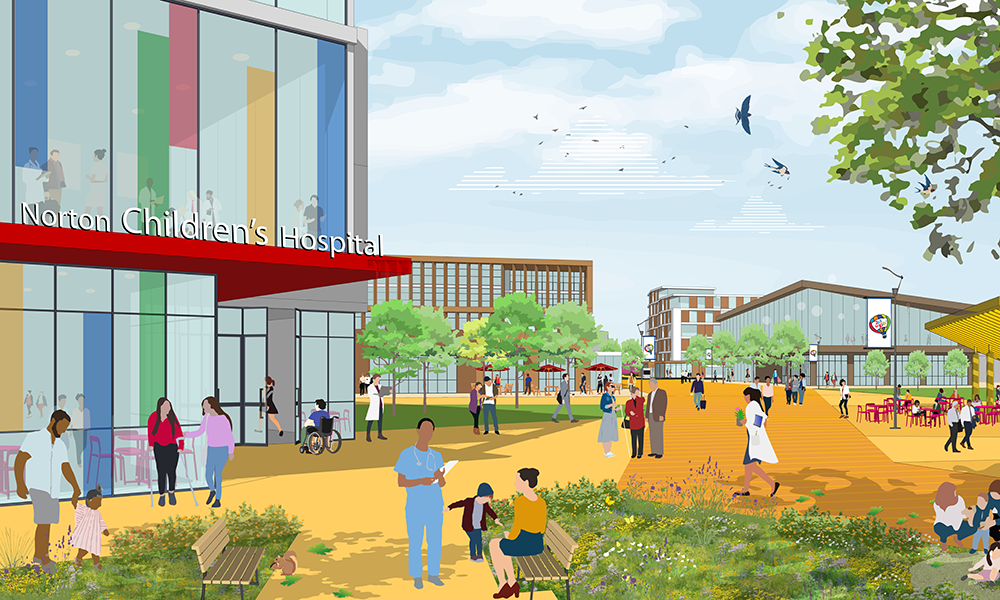By HCO Staff
PHILADELPHIA—Penn Medicine is launching a new community mental health hub at the Hospital of the University of Pennsylvania — Cedar Avenue (HUP Cedar), co-locating inpatient and outpatient psychiatric care with a new crisis response center (CRC) at the facility. The multi-year plan will put crucial psychiatric and substance use care in easy reach for West and Southwest Philadelphia residents, at a time when both mental illness and drug and alcohol dependence are surging in the city.
The project will begin with moving inpatient psychiatric and drug and alcohol detoxification units from Penn Presbyterian Medical Center to HUP Cedar in July, followed by the opening of a new crisis response center at the facility later in the summer which is expected to provide an estimated 4,000 patient visits each year. The steps will create two comprehensive, fully integrated mental health hubs at Penn Medicine facilities in Philadelphia, offering emergency mental health services and inpatient and outpatient care at both HUP Cedar and Pennsylvania Hospital, which has operated a CRC since 1999. Together, Pennsylvania Hospital and HUP Cedar will have 73 licensed inpatient psychiatric beds and 16 beds for substance use treatment. Additional space at HUP Cedar will allow for expansion of coordinated services to further care for West and Southwest Philadelphia communities over the next five years.
As one of the nation’s largest cities, Philadelphia’s mental health struggles are a microcosm of broader trends: A Pew Research Center survey from late 2022 reported that 41 percent of Americans — and nearly 60 percent of young adults — have experienced high levels of psychological distress at least once since the early stages of the pandemic. At the same time, more than two-thirds of Americans live in areas without sufficient psychiatrists and other mental health professionals. In Philadelphia, more than 20 percent of the city’s residents are coping with a diagnosed depressive disorder and substance use-related deaths have climbed to record levels.
Similar to the CRC at Pennsylvania Hospital, the HUP Cedar CRC — which will replace the CRC previously operated on the site by Mercy Philadelphia Hospital until its closure in March of 2020 — will be licensed as a crisis intervention walk-in facility and will serve as a discreet psychiatric emergency room, providing triage, evaluation, treatment and social services support for acute substance use and serious psychiatric conditions such as bipolar disorder, major depression, anxiety disorders, and schizophrenia.
The co-location of the inpatient psychiatric units with emergency care provided through the CRC will enable a seamless transition of care for patients, eliminating the wait time and additional steps required to transfer patients to inpatient units at other facilities — a common occurrence in a city where emergency psychiatric resources remain in short supply.
Staff at both CRC locations will be connected via a real-time data system providing details on bed availability in order to ensure patients can be placed as quickly as possible and that each location has the right staffing resources. Penn Presbyterian will continue to provide select outpatient psychiatric care as well treatment for substance use disorders after the transition of inpatient services to HUP Cedar.
HUP Cedar is part of the PHMC Public Health Campus on Cedar, which opened in March 2021, transitioning the building from the former Mercy Philadelphia Hospital into a campus offering emergency and inpatient care as well as primary care and community-driven social supports.
Penn Medicine will invest $5.76M toward the opening of the CRC at HUP Cedar as part of the mental health hub project. The CRC reopening has also received a grant from the Independence Blue Cross Foundation, and the City of Philadelphia Department of Behavioral Health earmarked $4.1 million in HealthChoices reinvestment funds.
In addition to Penn Medicine’s adult mental health services on the site, Children’s Hospital of Philadelphia plans to open an inpatient pediatric behavioral health facility, the CHOP Behavioral Health & Crisis Center, on the site, as well. The 46-bed acute inpatient psychiatric facility and 24/7 walk-in crisis center will create a safe, inclusive and restorative setting for children and adolescents.
The second phase of the new mental health hub plan will also increase care capacity at Penn Presbyterian Medical Center (PPMC), by converting the vacated psychiatric beds to medical surgical units. Those steps will help to improve patient movement across the hospital, reducing emergency department wait times and providing additional capacity for post-surgery recovery.
The new services at HUP Cedar are part of Penn Medicine’s wraparound commitment to bringing more mental health care support to the community across each of its mission areas. Penn Integrated Care (PIC), a program, which embeds mental health professionals in primary care practices, launched in 2018. More than 230,000 patients in 24 Penn Medicine primary clinics have access to PIC services. To date, 35,000 patients have been treated directly by PIC clinicians or connected to specialty care in the community.
Beginning this summer, the health system will add a new path for training fellows in drug and alcohol use treatment. That program, for physicians specializing in family medicine, primary care, and emergency medicine, among other disciplines, aims to ensure that providers in multiple settings are equipped to help patients take steps toward recovery and provides a much-needed addition to the existing fellowship in Addiction Psychiatry at Penn Medicine and the Corporal Michael J. Crescenz Veterans Affairs Medical Center (CMC VAMC) in Philadelphia. In addition, a new consultation service provides psychiatric care to patients hospitalized for complex medical needs at the Hospital of the University of Pennsylvania, Pennsylvania Hospital, and Penn Presbyterian Medical Center. Future plans include potential opening of a medical-psychiatric unit to ensure that patients with these complex needs are cared for in dedicated spaces.





